The Russian White & the
Russian Black in the UK
(updated
July 2013)
The
Russian Blues in the
UK can trace their ancestry
back prior to the 1890s,
and around that time
white, black and tabby
Russians also featured
occasionally in books
and articles. However,
the Russian White and
the Russian Black lines
now in the UK are descended
from two lines, brought
together in the Netherlands
in 1995. The first line
was developed by Frances
McLeod (Arctic) in the
1960’s and the
second the line produced
by Dick and Mavis Jones
in Australia in the 1970’s.
Frances McLeod stated
that her line was from
a white female kitten
born in 1961, which she
said was from a Russian
boat and given to her
by a friend. The GCCF
registered the kitten
as Arctic
Chumvi, Breed
No 26 AOV Foreign Type.
Sadly Frances McLeod
died earlier this year.
In the ‘60s, the
gene pool of the Russian
Blue was stated to be
low and limited out-crossing
to blue-point Siamese
and domestic cats was
carried out. As Chumvi
had an excellent coat,
the well-respected breeder
and judge Mrs Grace Pond
suggested mating that
white female to a Russian
Blue stud. Frances McLeod
followed a breeding programme
with the assistance of
Miss F H Laugher of Jennymay
Russians, mating Chumvi to a GCCF registered
Russian Blue stud, Meadliam
Lupun. The first two
litters comprised white
or blue kittens. However,
the third litter produced
a black kitten. This
showed that Chumvi was
in fact masking black
under her white coat.
A male white kitten
was put on the supplementary
register by the GCCF
as Arctic
Sumairki. On
later GCCF certified
printed pedigrees for
export he is shown as
Breed No 14. In 1963
all records would presumably
be handwritten, probably
on cards, and there would
not have been a Breed
number for a Russian
White. The new Russian
Blue Cat Society was
formed then and was looking
after the Russian breed,
with a new Standard being
produced in 1965.
Sumairki was subsequently
mated to a Russian Blue
female called Harvees
Amanda Too and the litter
included a white green-eyed
female called Osmunda,
registered by the GCCF
in 1968 as Russian White
16a 14c.
Frances McLeod continued
breeding and showing
her Arctic Russian Blues,
Whites or Blacks in the
UK for many years and
eventually went to Australia
where she continued breeding
Russian cats. Over the
years, other breeders
continued the white or
black Russian lines. |
A black kitten,
Arctic Lascatsya registered as 16a 15, was from a Russian
Blue dam Arctic Mishura and sired by a Russian White stud
masking black, Arctic Snowthistle. His line continued the
Russian Whites and had come down through Arctic
Finfreyer,
Arctic Osmanthus back to Osmunda, and all registered as 16a
14c.
Lascatsya was
bred on by Joan Lund (Lavengro) and her progeny in 1984 to
Russian Blue stud Arctic Dolphin
Chiricat included
a Russian Black female registered as Lavengro
Gypsy Rose 16a
15. | 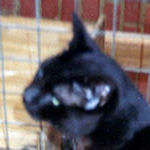
Lavengro Gypsy Rose |
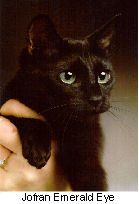
|
Frank & Joy
Smith (Jofran) carried
on the black line with
Gypsy
Rose and in 1986
exported a Russian Black
female Jofran
Emerald Eye to Belgium to Andrea Duerinck
(van Loth-Lorien).
Before she left the
UK, Emerald was mated
to a Russian Blue male
called Sini Ivan and
in 1990 she produced
a litter of six kittens,
three of whom became
European Champions for
their breeder, one blue,
two black. Emerald was
mated several times to
Russian Blue stud, GIC
Jofran Sergi also born
in the UK, and living
with Andrea Duerinck,
and produced some very
successful kittens who
went to Switzerland,
Germany etc. Emerald attained the title of
International Champion.
|
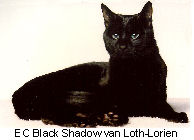 |
| A black son from Emerald’s first litter, European
Champion Black Shadow van Loth-Lorien,
was mated in the Netherlands to a Russian Blue queen owned
by Ingrid Nuyten (d’Affranchi) called Veruschka
van Marit Iris (whose sire was a Russian Blue EC
Tomanka Leonov also from the UK). That mating produced a Russian Black female
Tchornia Ludmila d’Affranchi.
Ingrid Nuyten had imported
from Australia a Russian
White male kitten, Ch
Yaralin Sjtsjoekin born
in 1993, from a well-known
breeder there, Hilda
Blackmore (Yaralin) who
died in May. She bred
his sire, Gold
DGC Yaralin Kosikh from her first
white DGC
Ramsallah Polar Viktor, bred by Mrs M
Friebel.
|
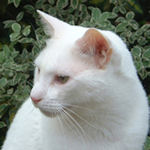
Ch Yaralin Sjtsjoekin |
These
whites were from the
Russian White breeding
programme started in
Australia in 1971 by
Dick & Mavis Jones
(Myemgay) from an imported
white cat stated to be
from Siberia and the
family pet of an official
at the Thai Embassy.
She was mated to their
Russian Blue stud, Ch
Myemgay Yuri, producing
two kittens, and they
kept one, White
Rose.
They followed a breeding
programme and the RASCC
recognised the Russian
Whites in 1975 to compete
for Championship status.
Again, a black kitten
had appeared in the third
generation, which was
formally recognised by
the RASCC in 1977, and
that line is still being
bred on separately in
Australia etc.
Polar
Viktor was sired
by Russian White DGC
Myemgay Arctic Kosack
bred down from Myemgay
Arctic Snowflake, Myemgay
Arctic Star and Myemgay
Arctic Girl a daughter
of White Rose.
Sjtsjoekin was mated to several Russian Blue queens and
those lines still continue separately in Europe. As he was
white masking blue, those lines only produce white or blue
progeny. Whilst with Ingrid Nuyten, he was mated to the black
female Tchornia
Ludmila d’Affranchi from the UK black
line. This is the only time in the records that shows a mating
between a Russian White and a Russian Black, and it did bring
back the ability to produce blue, white or black Russian
Kittens, plus return the genes of the UK blood line, which
had been lost in the UK. |
| The
next three generations
in Holland from that Sjtsjoekin
x Tchornia mating produced
Russian White females,
masking black. GIC
Bjella Dushka d’Affranchi (daughter of Tchornia)
had joined Evelien Bronsveld
(Chatuliem Russitiem’s),
who took her cats to Scotland,
including EC
Chatuliem Russitiem’s Orli and her daughter, Chatuliem
Russitiem’s Yentle born in 2003. She had produced
a Russian Black kitten
in the Netherlands, showing
she was genetically black. |
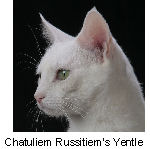 |
| After
Chatuliem
Russitiem’s
Yentle joined Jennifer
Sedgwick (Catwo) in England,
Yentle was mated to Russian
Blue European
Champion Ursus Blue-bis (bred
in Poland) and in November
2007 produced six kittens,
one Russian Blue, four
Russian White and one
Russian Black, all able
to be registered and
shown with the GCCF with
the Breed Nos of 16a,
16a 14c and 16a 15. |
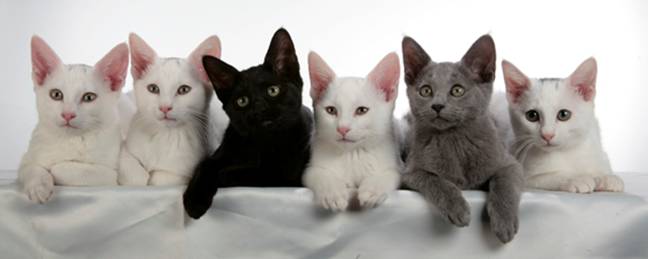
| First Litter born in 2007 - 4 Russian Whites, 1 Russian Black and 1 Russian Blue |
photo by Photocat |
|
|
Yentle’s second
litter in 2008 to a Russian
Blue stud born in the
UK, Grand
Champion Lubimiyeh Vaska, produced eight
kittens, 7 Russian Whites
and 1 Russian Black.
As with the first litter,
all colours of the kittens
were hearing tested,
but this time all the
whites were also DNA
tested, and it is interesting
that 5 of the 7 whites
were shown to be masking
black.
|
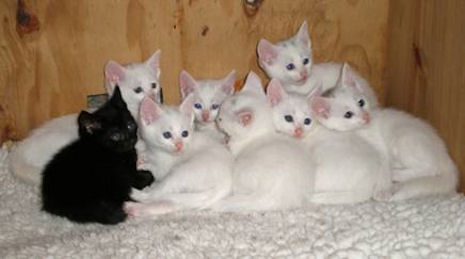
Second Litter of 7 Russian Whites and 1 Russian Black 2008
|
To the middle
of 2012, there have been around 40 litters of kittens descended
from the imported Russian White queen Yentle. Eight UK-born
Russian Blue studs and twelve UK-born Russian Blue queens
have been used. More than a dozen breeders throughout England,
Wales, Scotland and Ireland have been involved with continuing
the Russian White and the Russian Black, using some excellent
Russian Blues.
The Russian Blues from
these matings were included
on the GCCF Supplementary
Register and can be shown
at Championship level.
Several of these Blues
have been shown and have
been awarded Best of
Breeds and CCs.
The Russian White and
Russian Blacks were recorded
on the Experimental Register
and shown in Assessment
Classes. From 1st June
2011, the Assessment
Classes became competitive,
the cats being judged
and awarded a Merit Certificate
if worthy (as previously)
and also placed against
each other with a Best
of Breed awarded (if
available). The winner
could also be considered
for Best of Variety/Best-In-Show.
Russian Whites and Russian
Blacks are entered in
the same class, though
it can be split male/female.
Four Merits were required
to qualify, of which
two could be from kitten
classes. |
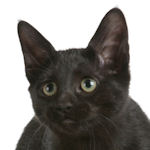
Catwo Kira |
The
first cat to achieve
four qualifying Merits
in the UK was a Russian
Black female from the
first litter bred by
Jennifer Sedgwick, Catwo
Kira, and owned by Judith
Noble (Larksong Russians).
Her success was shortly
followed by a Russian
White male, Catwo
Dimitri,
from the second litter,
and now living with Catherine
Kaye (Sithee Russians). |
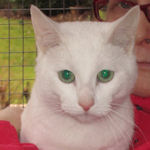
Catwo Dimitri |
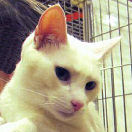
Catwo Biaty Pantera |
Further
cats to qualify with four
Merits have been Catherine
Kaye’s Catwo
Biaty Pantera (Best Assessment
Russian at the 2009 and
2010 RBBA Shows).
Also Catwo
Cairnicatski owned by Wendi Johnson,
both litter sisters to
Dimitri. That was a very
special litter of 8 Russians! |
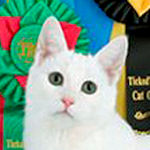
Catwo Cairnicatski |
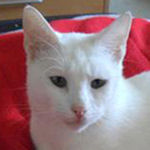
Adniosh Catwo-Crystal |
The
next cat to qualify was
also a Russian White
female bred by Bev Pursglove
called Adniosh Catwo-Crystal,
now living with Stephanie
Eborall (Warwick Russians),
who had previously bred
Russian Blue and Russian
White cats in South Africa.
The sixth qualifying
cat was a Russian Black
female bred by Catherine
Kaye and sired by her
Dimitri.
Andrea Cherry (Brightlite
Russians) quickly gained
five Merits with her
Sithee Madam Belladonna. |
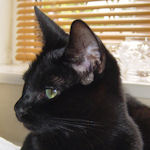
Sithee Madam Belladonna |
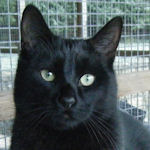
Elenita Buskin Rascal |
A
further Russian Black
male, Elenita
Buskin Rascal, bred and owned
by Sandra Hipkin (Elenita
Russians) obtained his
fourth qualifying Merit
in October 2011.
Then in March 2012,
another black female,
Adelfsh
Cosmos, bred
and owned by Julia Watling
achieved her fourth Merit.
|

Adelfsh Cosmos |
Interestingly,
that made 4 Russian Whites
and 4 Russian Blacks
achieving GCCF qualifying
Merits.
However, a Russian White,
Cairnicats
White Royal,
bred in the UK by Wendi
Johnson and then owned
by Beata Raszka (Colinsgarden
Cattery) in the Republic
of Ireland, also obtained
five GCCFI merits by
the end of October 2011.
White
Royal is now living
with Sarah Williams-Ellis
(Serennol). | 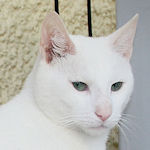 Cairnicats
White Royal Cairnicats
White Royal |
Several
other Russian White or
Russian Black kittens/cats
were awarded Merits and
these include Serennol
Night Star, a
beautiful Russian Black
female, bred and owned
by Sarah Williams-Elliss
(Serennol Russians). Night
Star,
who was sired by Sarah’s
UK
IGrCh Serennol Dmitri,
was Best Assessment Russian
at the 2011 RBBA Show.
Further
Russian Black merit winners
are Elenita
Melayzia Gipsyrose owned by Jim & Mary Bowdrey
and Tocoya
Zinoviy bred
and owned by Jill Wakefield
(Tocovya Russians). However,
Cairnicats
Magnus owned
by Elaine Littlewood
(Milov Russians) is a
Russian White male.
At
the October 2011 Council
Meeting, the RBAC proposal
was passed for the Russian
White and the Russian
Black to progress to
Provisional Status and
from April 2012 these
breeds were able to compete
for Intermediate Certificates,
Best of Breed and Best
of Variety.
The
first winner of an Intermediate
Certificate was Elenita
Buskin Rascal (16a 15)
on the 5 May 2012 at
Bristol & District
CC Show shortly followed
by Cairnicats
Magnus (16a 14c) on the 20 May
2012 at the Midland Counties
Cat Club Show.
This
was shortly followed
by Catwo
Biaty Pantera (16a
14c) winning ICs & BoBs
at the Gwynedd and the
Chester & North
Wales Shows, plus Sithee
Madam Belladonna (16a
15) also being awarded
ICs & BoBs at the Teesside
and Wyvern CC shows.
The first Russian White
or Black to win the three
ICs was in fact Catwo
Biaty Pantera who
achieved her third IC
at the Russian Blue Breeders
Association Show on 6
October 2012. She was
also Best Intermediate
Status.
Catwo
Biaty Pantera’s black
daughter, Sithee
Madam Belladonna,
now living with Andrea
Cherry (Brightlite),
achieved her third
IC by 17 October at
the Yorkshire Cat Club
Show. She then visited Ch
Melkelter Gaspar Galena and
in February produced
5 kittens, two Blue
and three Black. These
Brightlite kittens
were the first to be
allocated CS registration
numbers for the now
approved new breeds.
Kittens
from these breeds can
compete for BoBs and
BOV, and the first
kitten to be nominated
for Best of Variety at
the Teesside show was Brightlite
Inki Black (16a
15) bred and owned
by Andrea Cherry.
Brightlite
Inki Black, who is a
daughter of Sithee
Madam Belladonna, had achieved
three ICs and BoBs by
January 2013. She then
went to stud and produced
a healthy litter of 6
kittens (four Blue, two
Black) in April 2013.
Two
further kittens, both
bred by Kate Kaye, were
shown as kittens, with
both achieving 1st & BoBs.
Sithee
Izzizzbabie is
owned by Sue Young (Siykat)
who had previously owned
Russian Whites, whilst
Sithee
Sparklingicemaiden lives with Stephanie
Eborall (Warwick). In
fact Sparklingicemaiden was the first Russian
White or Black to achieve
a Best
of Variety Foreign award, which was at Kentish
CC Show in October 2012,
courtesy of judge Mrs
Pam Wilding.
In
January 2013 Sithee
Sparklingicemaiden achieved two Intermediate
Certificates and two
BoBs at the joint Short-Haired
Cat Society and RACCS
Shows, since when she
has been at stud and
produced a litter of
one Russian Blue and
three Russian Whites.
It
has been a busy year
with litters with Elaine
Littlewood (Milov) breeding
three litters. Sandra
Hipkin (Elenita) had
two litters sired by
her Catwo
Romanov (16a
14c) which included a
White girl and a Black
boy. And Joanne Gadd
(Grayshus) produced a
litter of the three colours
from her Elenita
Cherbeliz (16a 14c) sired by GrCh
Kerwil Scryabin Krivak.
Meanwhile,
Jill Wakefield (Tocovya)
produced another litter
of Blue, White and Black
from her own-bred Tocovya
Nzura Sara sired by Catwo
Dimitri. Pauline Nelson
also had a similar litter
of 4 from her Grayshus
Markiza Stepanya (16a
14c).
In
the Bristol area, Julia
Watling’s own
bred Adelfsh Cosmos gave birth to a litter
of 5 sired by GrCh Larksong
Luvin Lord Sithee.
On the other side of the country, Sarah Williams-Ellis
produced two litters sired by her UKIGC
Serennol Dmitri and two litters sired by Cairnicats
White Royal.
Russians
were also in prominence
at the London Pet Show
on 11th and 12th May.
The Russian & Abysinnian
Cat Club of Scotland took Russian Blues on
the Saturday, whilst the Russian Blue Breeders
Association took two Blues and a Russian
White on the Sunday.
Meanwhile,
both the Russian
Registration Policy and the Recommended
Breeding Policy for Russian
Cats have both been approved
by Council and are available on the
GCCF and RBBA or RACCS
websites.
The
great news from the GCCF
Council Meeting held
on the 26 June 2013 was
that in future new breeds
would work through the
Preliminary Section straight
to Championship. Any
breeds then at Provisional
level would not be
required to continue
attaining the required
number of Intermediate
Certifiates etc but
would progress to Championship,
technically from the
26 October 2013.
However,
after a good deal of
discussion it was pointed
out by several Breed
Clubs, including the
RBBA, that their annual
Club Shows were earlier
than that date. It
was agreed that those
Clubs could put on full
championship classes
for their own breeds.
So, at the Russian Blue
Breeders Association
Show on 5 October 2013,
there are champion /
premier classes for the
Russian White and the
Russian Black. In their
case, the classes will
be jointly for the two
breeds, with the Russian
Blue in separate open
classes.
The
first kittens have now
been registered with
the new full CS registration
numbers.
The
GCCF Standard for the
Russian Black states
that it is a Russian
Blue in all respects
except for colour. The
coat colour is a dense
glossy black to the skin
with black nose leather
and paw pads.
The
coat of the Russian White
masks the genetic colour,
which here in the UK
is blue or black, and
which can be checked
by a DNA test. The
coat must be pure, sparkling
white with no
hint of discolouration,
although a kitten
or young adult may temporarily
carry small dark
patches of blue/black
on the head. Before any
progeny may be registered
from a Russian White
sire or dam, this cat
must have a certificate
of freedom from deafness.
Melva
Eccles |

|









